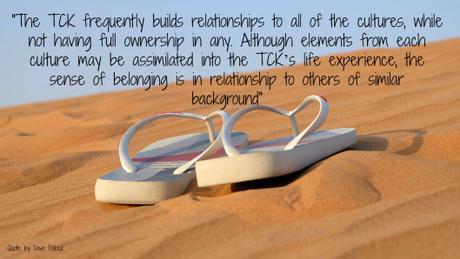
Readers – I’m traveling today so sending you over to A Life Overseas where the gifted Lisa McKay shares some excellent thoughts for teachers working with TCKs. I urge you to read her article and pass it on!
Here is an excerpt:
I was talking to the principal of an international school recently, and he had never heard the term “Third Culture Kid” (TCK).
This really surprised me. By now, after more than three decades of research dedicated to understanding the impact of growing up globally mobile, I had assumed that those working with TCKs would at least be familiar with the concept.
Since this conversation, I’ve been thinking about what I want my children’s teachers to understand about TCKs. What are the basics they should know? And how this knowledge could prove helpful to them as they guide these children in the classroom and on the playground?
Key Points About TCKs For Teachers
The late Dave Pollock provided a good definition of third culture kids:
“A Third Culture Kid (TCK) is a person who has spent a significant part of his or her developmental years outside the parents’ culture. The TCK frequently builds relationships to all of the cultures, while not having full ownership in any. Although elements from each culture may be assimilated into the TCK’s life experience, the sense of belonging is in relationship to others of similar background”
The childhood lifestyle of TCKs (one high on cross-cultural experiences and mobility) impacts development patterns, fosters certain character traits, and influences the way these children typically interact with others and form relationships. These characteristics often become more pronounced in older TCKs and on into adulthood (a four-year-old TCK, for example, may seem anything but flexible, mature, and socially competent).
3 Typical Areas Of Strength For TCKs
There is now a significant body of research that identifies some of the typical strengths and areas of challenge associated with growing up in more than one culture. Here are some of the strengths/benefits that the third culture kids often develop over time:
-
Flexibility/Adaptability
Over time, TCKs learn to blend effectively into new places and adapt to new settings and experiences. Many TCKs become so skilled at doing this that they are akin to chameleons—easily adjusting their dress, language, and style of relating to reflect their surroundings.
-
Maturity/Perspective
TCKs often seem more mature than their peers–particularly in the ways they interact with adults and how they view the world. Their diversity of life experience tends to broaden their perspective and cure them of black and white thinking at an unusually young age. This, combined with the acute observational skills that help them adapt to new settings, tends to make TCKs skilled at picking up on nuance and seeing more than one side to situations.
-
Advanced cross-cultural communication skills and general social skills
Third culture kids become practiced at communicating with those from other cultures and backgrounds. When it comes to making friends, they tend to have the ability to form unusually intense connections with others fairly quickly. In part, this tendency to form fast and deep relationships comes about because TCKs often jump straight to talking with others about universal life experiences such as passions, hobbies, family and relationships, rather than trying to connect around more culturally-bound topics such as TV shows and sporting
3 Common Areas Of Challenge For TCKs – Read the rest of Lisa’s article here at A Life Overseas!
Photo Credit: https://pixabay.com/en/sandals-flip-flops-footwear-beach-342672/ word art Marilyn Gardner

